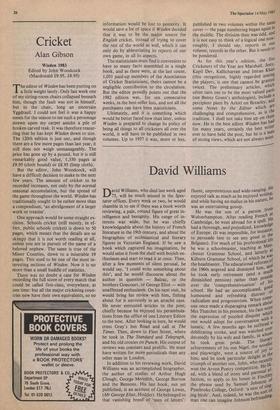David Williams
David Williams, who died last week aged 73, will be much missed in the Spec- tator offices. Every week or two, he would shamble in to see if there was a book worth reviewing, a pale, rotund figure of great in- telligence and benignity. His range of in- terests was wide, but he was chiefly knowledgeable about the history of French literature in the 19th century, and about the biographies of ecclesiastical and literary figures in Victorian England. If he saw a book which captured his imagination, he would seize it from the shelf with boyish en- thusiasm and start to read it at once. Then, after a few moments of silent perusal, he would say, 'I could write something about this'; and he would discourse about the author in question — Balzac, or the brothers Goncourt, or George Eliot — with unaffected enthusiasm. On his next visit, he would bring his review with him, fishing about for it nervously in an attache case. He never entrusted articles to the post; chiefly because he enjoyed his perambula- tions from the office of one Literary Editor to the next. After looking in here, he would cross Gray's Inn Road and call at The Times. Then, down to Fleet Street, where he took in The Standard and Telegraph, and his old cronies on Punch. His output of reviews was constant and prolific. He must have written for more periodicals than any other man in London.
In addition to his reviewing work, David Williams was an accomplished biographer, the author of studies of Arthur Hugh Clough, George Meredith, George Borrow and the Bensons. His last book, not yet published, is an account of George Lewes, (Mr George Eliot, Hodder). He belonged to that vanishing breed of 'men of letters': fluent, unpretentious and wide-ranging. He enjoyed talk as much as he enjoyed writing, and while having no malice in his nature, he was an entertaining gossip.
He was the son of a parson iron Wolverhampton. After reading French at Cambridge, he went abroad for a spell. He had a thorough, and prejudiced, knowledge of Europe. (It was impossible, for instance, to persuade him to see any good in Belgians). For much of his professional hre he was a schoolmaster, teaching at Man- chester Grammar School, and latterly at Kilburn Grammar School, of which he was, the headmaster. The educational reforms ocl the 1960s angered and dismayed him, anh he took early retirement (and a niti.Ac, diminished pension) rather than Prest:.; oyer the 'comprehensivisation' of uld- school. He had an uncomplicated, 8°° humoured and refreshing distrust °` radicalism and progressivism. When sante; one once made a disparaging remark ab011 Mrs Thatcher in his presence, his face wOre the expression of puzzled disquiet %onoa one would adopt for conversation with _ lunatic. A few months ago he suffered 3 debilitating stroke, and was watched over devotedly by his wife and family, in wh°51 he took great pride. The litera.rYt achievements of his son Nigel, the nove11,5, and playwright, were a source of JOY him; and he took particular delight in th, triumph of another son, John, who recen.tklY, won the Arvon Poetry competition. He 114., ed, with a blend of irony and parental al tection, to apply to his house in FinchleY, the phrase used by Samuel Johnson. 01, Pembroke College, Oxford: 'a nest of snig, ing birds'. And, indeed, he was the sort 01 man one can imagine Johnson befriending.










































 Previous page
Previous page